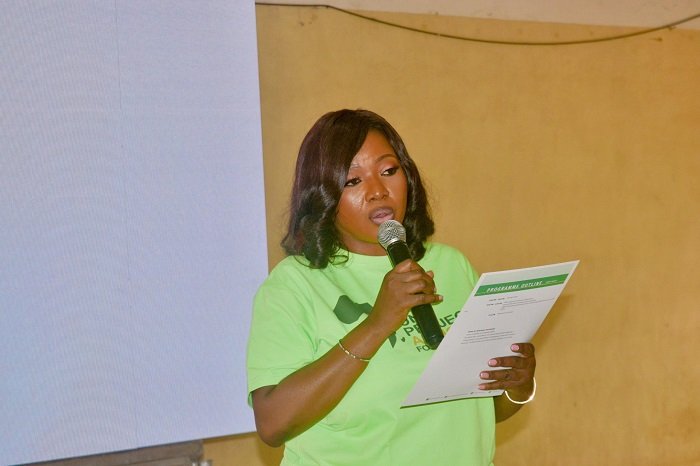News
Psychological distress rises among teenage girls

The Mental Health Authority of Ghana has recorded rising psychological distress cases among teenage girls in the country.
The rise, according to the authority, is linked to academic pressure, family issues, gender-based violence, and isolation.
This was disclosed by Victoria Naema Abdulai, the founder of the One Project Africa Foundation (OPAF), a non-profit organisation focused on empowering women and girls.
Ms Abdulai said this at a mental health awareness session organised by the foundation for students of the Accra Girls Senior High School in Accra.
It was held under the theme “Empowering Her Mind, Voice and Power: Fostering a Resilient Tomorrow for the Girl Child through Mental Wellness,” which was aimed at building self-awareness, promote emotional healing, and encourage resilience among young girls.
She stated that mental health was not a luxury but the foundation on which every girl’s future should be built
Ms Abdulai said despite the rising need, mental health remains one of the most misunderstood and neglected issues in our society.
She said without mental wellness, young girls will continue to struggle silently with learning, dreaming, and relating to others, warning that the lack of attention to girls’ mental health is costing society their potential.
She urged students to embrace their emotions and seek help when struggling. “You are not weak for having emotions. You are human. Seeking help does not make you a failure, it makes you courageous.”
Touching on what the foundation does, Ms Abdulai said the foundation teaches girls how to pass exams but not how to process pain, obey instructions but not how to handle rejection. We are obsessed with excellence but ignore the exhaustion.”
A Mental health practitioner and addiction specialist, Esther Kyewaah Opoku, on her part stated that mental health was not separate from general well-being but central to it. “Without your mental health, you are not healthy,” she said.
She mentioned that adolescence is a fragile period, with the brain still developing until age 25.
She disclosed that one in seven adolescent girls in Ghana has a mental disorder, with 26 per cent experiencing depression, 29.8 per cent emotional distress, and 14.8 per cent suffer trauma or behavioural issues.
She also blamed these conditions on peer pressure, bullying, sexual abuse, and toxic comparisons driven by social media. “We are sitting on a time bomb,” she said, urging early intervention and compassion.
According to her, adolescence is a critical stage of mental and emotional development, during which the executive brain, or forebrain, continues to form until age 25.
“This period is filled with vulnerabilities that, if unmanaged, can lead to lifelong challenges,” she said.
Ms Opoku therefore called for compassion, peer support, and continuous education on mental health to break the cycle of silence and stigma, particularly among young girls, saying “nobody should feel alone or hopeless.”
By Stephanie Birikorang
News
Man sentenced to 25 years for robbery at Manso Akwasiso

A 30-year-old man has been sentenced to 25 years imprisonment with hard labour by the Bekwai Circuit Court for his role in a 2022 robbery at a mining site at Manso Akwasiso in the Ashanti South Region.
The convict, Dominic Ofori, also known as Fanta, was arrested on 16th February 2026 after years on the run. He pleaded guilty before the Bekwai Circuit Court to robbery contrary to Section 149 of the Criminal Offences Act, 1960 Act 29, and was accordingly sentenced to 25 years imprisonment with hard labour.
On March 20, 2022, the Manso Adubia District Police received intelligence that a group of armed men from Manso Abodom were planning to attack a mining site at Manso Akwasiso to rob the owner of gold concentrate. Acting on the information, police mounted a coordinated operation and laid an ambush at the site.
At about 5:30 pm the same day, four-armed men arrived at the site, fired indiscriminately, and robbed the miners of their gold concentrate. The police team on surveillance intervened, resulting in an exchange of gunfire.
Three of the suspects, Abu Abubakar, Musah Latif, and Gideon Takyi, sustained gunshot wounds and were pronounced dead on arrival at St Martins Catholic Hospital at Agroyesum. Dominic Ofori escaped at the time but was later arrested and put before the court.
The Ashanti South Regional Police Command has assured the public of its continued commitment to combating violent crimes and bringing offenders to justice.
News
Ashanti police arrest man for publishing false news on TikTok

The Ashanti Regional Police Command has arrested 45-year-old Isaac Boafo, also known as “Duabo King,” for allegedly publishing false news intended to cause fear and panic.
Police said the arrest follows a viral TikTok video in which Boafo claimed that four officers at the Central Police Station in Kumasi engaged in inappropriate conduct with commercial sex workers during night patrols in Asafo.
Officers from the Police Intelligence Directorate (Ashanti Region) apprehended Boafo after receiving intelligence about the video.
During questioning, he admitted to creating the video to attract views and engagement online, and acknowledged that he could not prove the allegations.
Boafo also admitted making comments about the President of the Republic for content purposes and could not defend those statements.
He has been formally charged and is in detention as investigations continue.
The Ashanti Regional Police have warned the public against publishing or sharing false information on social media, noting that such acts can cause fear, panic, and damage reputations.
They said anyone found engaging in similar conduct will face legal action.
By: Jacob Aggrey














